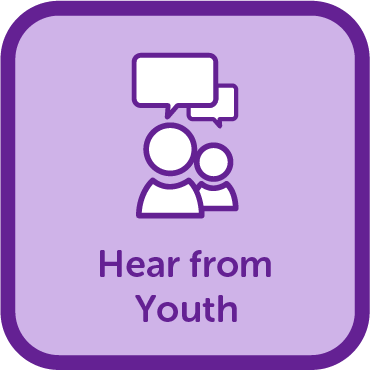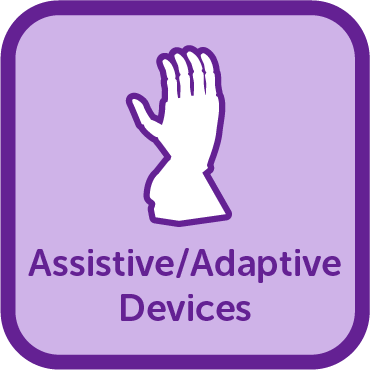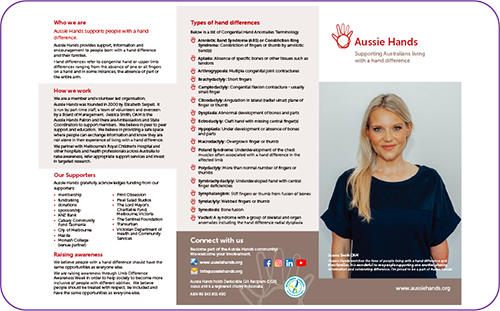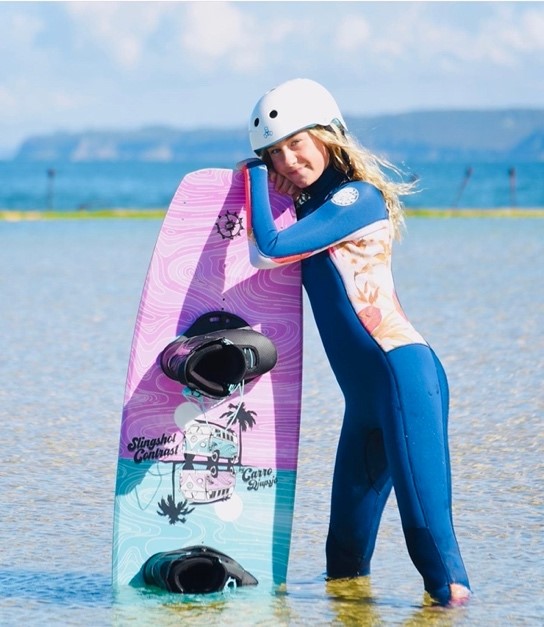
FEELING GOOD
ABOUT MYSELF
Being a teenager and starting high school is an exciting time. You will experience new things, make new friends and probably want to learn new skills and hobbies.
But it is normal to have days when you may not feel 100% positive about yourself. When that happens, it can be helpful to know that you have the capability to achieve your goals and there are strategies to boost your confidence. It can also be super helpful to see other people achieving their goals – if they can do it, so can you!
Hear From Aussie Hands Youth
Aussie Hands youth have shared what they do to look after their mind and body. They share their ideas to boost self-esteem and to feel good about themselves.

Claire believes in herself
‘You can do anything you want to. It might take a little longer to do it, or you may need to do it in a different way, but you can do it. Always believe in yourself.’
Building confidence starts from a young age. When Claire was having a baby photo taken, her mum Danielle realised that the photographer was trying to position her to hide her special hand, and said: ‘No, that’s her, we don’t want her hand hidden’. Danielle is sure that attitude has rubbed off on Claire and given her the confidence she has today to be proud of her difference.
Claire started dancing when she was four years old as her parents thought it would be a good confidence booster because of her hand difference, and she hasn’t looked back since.
‘I do cheerleading and am also with a modelling agency. One of my proudest moments was appearing on the front cover of Katwalk Fashion Magazine Issue One, March 2020.
I have my own Instagram page and a lot of girls and mums who are expecting or recently had a baby with a hand difference, contact me to say how inspired they are by my achievements. When other kids are curious and ask questions about my hand, I just say ‘I was born like that’.
Read more about Claire.
Knox stays active to stay positive
Playing sport or listening to music helps boost my self-esteem, confidence and feeling good about myself.
I like swimming, rugby, cricket and little athletics and also do singing lessons and acting classes. It’s great to do a lot of different activities to find out what I really enjoy and am good at, so now I’m developing my swimming and acting. Staying active helps me keep fit and it also allows me to stay positive mentally and be able to do day to day stuff without getting too down.
Thanks to my parents, I have so many things that I’m involved in. If I didn’t have that support I might not be doing as well as I am.
Music is a big part of feeling positive. Music helps put me in a good mood and concentrate, so I have music just for getting pumped up before a swim race.

I know that parents think they know what’s best for us, but I think they also need to trust that their kids can do things, listen to what they have to say and accept that they will want to start making decisions for themselves. If decisions are made for us, like what activities we want to do, then we’re not going to survive when we become young adults and need to be independent.
My advice to other teenagers is to find something that you love and that you’re good at, and commit yourself to that and no matter what it is, just try and stay with that and stay true to yourself.
Read more about Knox.
Tia heads to the gym to recharge
For me, a positive body image comes with acceptance. You need to be proud of your difference; it doesn’t define you. It’s a part of you. I know I wouldn’t be the person I am today without my limb difference and I wouldn’t change it for the world. However, my attitude has come from accepting my difference and not allowing it to define or restrict me in anything that I do.
When I’m feeling down, I head straight to the gym. I find that when I train, I forget everything and focus on my workout. I always leave feeling accomplished, positive, refreshed, calm and ready to tackle whatever has been eating away at my mind. With that being said, I always let myself feel every emotion. If I’m stressed, overwhelmed or sad, I let myself feel it. If I need to just cry it out, I will. Everyone has their fix – for some it may be music or going for drives, but for me it’s definitely blasting my old school dance party playlist and heading straight for the weights.
I grew up extremely independent, and I owe that to my parents as they never babied me. For example, when I would cry about not being able to do something, they wouldn’t help me if they knew I could do it by myself. This really helped me develop my problem-solving skills and adaptability.
Confidence comes from within. It’s so important to love yourself first, take a step back and appreciate how amazing you are. Venture out of your comfort zone and try things that you’ve never done. There is no better feeling than smashing an activity you never thought you’d be able to. I can guarantee that smile will light up the world.
Natalie suggests seeking support
I think that many of us, including myself, are still working on our self-esteem and confidence – and that’s okay. Being only 21, my young adult self is still working through these and finding solutions. Self-esteem and feeling about good about myself aren’t permanent or mutually exclusive things. Depending on the day, they fluctuate, and some days are definitely harder than others.
I think there is a lot of pressure that we place on ourselves to be “normal” and not show that we are struggling and that we are fiercely independent (sometimes to a fault). Accepting help can be difficult, especially when trying to prove yourself. I think a difficult part of this is acknowledging that while we are still incredibly capable, there can be limitations to what we can do. That’s not to say listen when people when they place their own limits on you and saying you can’t do it, but rather being aware of where you may need support to achieve what you want.

Regardless of what people say about sticks and stones, words can hurt, and kids (adults too) can be borderline cruel at times. It can be really tough, and there’s no one solution that works in these situations. My best advice is seeking support from trusted people, teachers, friends, family, counsellors and also talking with people in a similar situation.
If you would like to have a chat with me about making friends, confidence, self-care & independence or learning to drive, I am more than happt to be a Mentor so please book a timr with me though the Peer Support Network.
Hear From Experts
We spoke to occupational therapists and psychologists, who gave us an insight into ways to make sure you are looking after your mind and body. Here are their top tips:

Practice mindfulness
Mindfulness is any activity in which you are entirely present at that moment in time. It is when you fully engage with your surroundings without distraction or judgement.
‘Resting the mind, even when awake, is important. Mindfulness helps us to feel calmer and more in control.’
Some activities that are great for mindfulness include:
- Meditation
- Gardening
- Cooking
- Painting
- Sport
There are also some great apps that can help you practice mindfulness:

Talk about your feelings
Talking about your feelings can be very beneficial. It can help you process your thoughts and emotions and help you better understand how you are feeling. The person you are talking to may help put a name to your feelings or offer some advice, but there is also value in just talking to be heard.
‘Talk to a trusted adult about your feelings. This could be your parents but could also be a guidance counsellor, a mental health professional, a peer support worker, or your chaplain at school. Those people are really in those roles to help support your confidence, resilience and feelings.’

Accept how you feel
You may want to rush to solutions when you feel down, but sometimes it can help to sit with your emotions, acknowledge them, and give them a name. Recognise that whatever you are feeling is valid and the feelings are OK to have. Once you have identified your emotions and thought about why you might be feeling that way, you can work on reframing your thoughts or finding a solution.
‘Whatever you are experiencing and whatever you are feeling, others will have felt the same. Don’t be ashamed or embarrassed.’

Try new things
Trying new things and improving new skills can be a significant confidence boost. It also gives you new ways to make new friends and connect over shared interests.
‘We feel good about ourselves when we get to enjoy and do the activities that we like doing.’

Look after your physical health
Your physical health is intertwined with your mental wellbeing. Eating well, getting regular exercise, and ensuring you are getting enough sleep are all critical aspects of making sure you feel great.
‘The proven ways to look better and feel better are eating well, getting some regular exercise and at least 8 hours sleep each night.’

Be kind & help others
Being kind and helping other people is a great way to feel good about yourself. Examples could include volunteering, helping a neighbour or helping a classmate understand something you’ve learnt in school. Helping others can help improve your skill and confidence with the task you are assisting others with. In addition, being kind to others often opens up more opportunities.
‘Being kind is an important component, but volunteering or helping someone with something makes us feel good about ourselves. Being involved in many activities also gives us confidence in different areas of life plus we meet new people and learn new skills.’

Don’t compare yourself to others
We sometimes tend to compare ourselves to other people, but it’s important to remember that everyone is unique and special. In a world of social media, it can be even harder to avoid making comparisons. We are all different in our own way and will achieve things at our own pace. Using social media purposefully, unfollowing people who make you feel bad, and seeking out positive people or role models who make you feel good can make a world of difference for your self-esteem.
‘Whether you have a limb difference or not, teenagers often go through a stage where they might be worried about their popularity or not looking as good as someone else. Having a limb difference may or may not add another dimension to that.’

Recognise when you need some extra help
Sometimes you might need extra help, and that’s OK. Up to Up to 1 in 7 people aged between 4 and 17 experience a mental health condition each year.
Some signs that you may be experiencing depression include having a lack of energy or losing interest in things you used to enjoy, or feeling down for longer than ten days. If this sounds like you or you just don’t feel as positive as you usually are, then you might benefit from visiting a doctor and creating a mental health plan. Likewise, a mental health plan can also be helpful if you feel overwhelmed or anxious to a point where your everyday life, such as eating, sleeping, and concentration are being impacted.
You can ask a trusted adult to help you organise an appointment. If you are over 16, you are eligible for your own Medicare card and could arrange to see a doctor on your own if this is more comfortable for you.
‘Anxiety and depression are two of the most common issues that doctors and counsellors treat and are nothing to be ashamed of. There are a range of strategies and treatments they will be able to suggest to assist you to work through things.’
If you need support immediately, please call one of these numbers:
- Kids Helpline – 1800 55 1800
- Lifeline – 13 11 14
Considering Assistive or Adaptive Devices
Whether you used a prosthesis as a child or not, you may now be wanting to explore new options as a teenager. A prosthesis can give you flexibility and increase your confidence. Seeing your friends or classmates having fun bike riding, playing a musical instrument, or cooking may also motivate you to try new activities.
A prosthesis may also be worn for aesthetic, social, emotional, and identity reasons. Ultimately, it will come down to your personal preference and individual needs.
A prosthetist can work with you to design a prosthesis that best suits your needs and continue to review and adjust this as your needs change. An occupational therapist with specific experience in upper limb difference, will work with the prosthetist to determine the psychological and functional goals for the prosthesis prescription.
There is also a variety of adaptive equipment available for sports or music.
TRS Inc. is a prosthetic service that has a range of devices suitable for sport and music including bike brakes, prosthetic straps for weight training and adapters for guitar picks, drum sticks and violin bows.’ – Limb Management Clinic Coordinator at Sydney Children’s Hospital, Randwick Leslie Wollin.
Here are a couple of TRS Inc. examples:
Bike Brakes
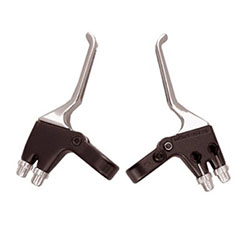
Guitar Pick Adapter
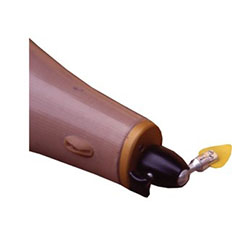
You can also check FREE 3D Hands and Active Hands for more examples.
Aussie Hands member Tia feeling proud
When I was introduced to weight lifting I felt indestructible. Now I feel so proud and accomplished that I am able to lift these heavy weights even with my hand difference. It’s a great hobby to keep both a healthy body and mind.
I got my prosthetic from APC Prosthetics. They designed the cast to fit my arm, and I chose different attachments to place on it to do different activities at the gym.
Check out Tia doing barbell bench press:
Aussie Hands Patron Jessica Smith OAM demonstrates upper body exercises
I use a medicine ball and step to achieve balance in my shoulders so that I can easily go from one movement to the next.
Check out Aussie Hands Patron Jessica Smith OAM doing upper body exercises:
‘Even though you might sometimes be very self conscious about your limb difference, the majority of people don’t have an issue with it.’





